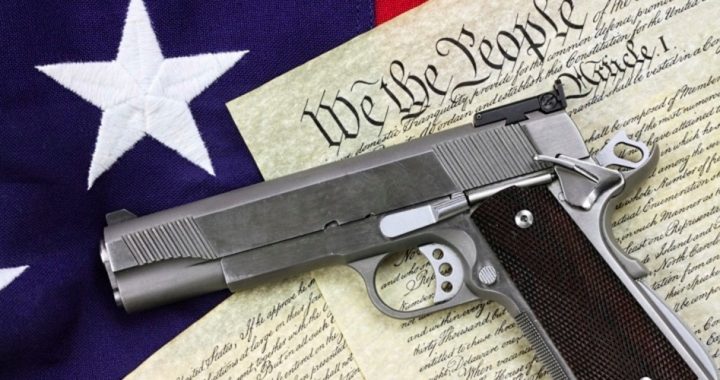
The Kentucky state House of Representatives is considering a bill that would nullify any federal attempt to take guns from citizens of the Bluegrass State.
By voting for this measure, Kentucky state legislators could stand up and perform their constitutional obligation to check federal usurpation.
The bill, introduced by State Representative Diane St. Onge (R), is a force rejection of recent federal regulations that disregard the Second Amendment’s protection of the right of the people to keep and bear arms.
HB 429 sets up the shield of state sovereignty and takes direct aim at the disarmament scheme. Among other provisions, the bill would:
invalidate and nullify all federal laws and regulations restricting ownership or possession of firearms; direct the General Assembly to take all appropriate action to safeguard Kentuckian’s rights to possess firearms in accordance with the 2nd Amendment to the Constitution of the United States and Section 1 of the Constitution of Kentucky.
As of this writing, the measure enjoys the support of 13 co-sponsors.
Although certainly a praiseworthy attempt to shore up the right own weapons, a blog post published by the Tenth Amendment Center points out some of the proposal’s deficiencies:
The bill does not create any mechanism to stop enforcement of federal gun laws, but would set the stage for further action. The next step would be to pass a Second Amendment Preservation Act barring state cooperation with enforcement of any federal firearms laws. Since a vast majority of federal enforcement actions require the leadership, help and/or assistance of state or local governments, agents and resources — widespread refusal to enforce or participate in enforcement will severely cripple federal efforts.
An effort consistent with this wise constitutional counsel would be in line with the tack recommended by James Madison in The Federalist, No. 45, where he encouraged state lawmakers, in order to prevent federal abridgment of fundamental liberties, to refuse “to co-operate with the officers of the Union.”
The Kentucky bill, though not perfect, does cite the Tenth Amendment as authority for its rejection of the federal gun grab, pointing to the potential exercise of the principle of nullification.
Nullification, as explained by Thomas Jefferson and James Madison, is the most powerful weapon against the federal assault on state sovereignty and individual liberty. By applying the principles set out in the Kentucky and Virginia Resolutions, states can simultaneously rebuild the walls of sovereignty once protected by the Constitution, in particular the Tenth Amendment, and drive the forces of federal consolidation back to the banks of the Potomac.
The text of the bill recognizes this fact, declaring:
The General Assembly of the Commonwealth of Kentucky finds and declares that it is the duty of the General Assembly and its members to protect and defend the Constitution of the United States and the Constitution of Kentucky.
Later, along the same lines, the bill reads:
It shall be the duty of the Kentucky General Assembly to adopt and enact any and all measures as may be necessary to prevent the enforcement of any federal act, law, order, rule, or regulation in violation of the sections of and amendments to the Constitution of the United States specified in Section 1 of this Act.
Although the Kentucky bill (and others like it) rely specifically on the 10th Amendment and the companion constitutional principle of nullification, the narrower concept of anti-commandeering supports their position, as well.
Anti-commandeering prohibits the federal government from forcing states to participate in any federal program that does not concern “international and interstate matters.”
While this expression of federalism (“dual sovereignty,” as it was named by Justice Antonin Scalia) was first set forth in the case of New York v. United States (1992), most recently it was reaffirmed by the high court in the case of Mack and Printz v. United States (1997).
Bills thwarting the president’s efforts to consolidate control over all guns and ammunition in the hands of federal agencies are being debated all over the country. Citizens of these states are encouraged to contact their state representatives, congratulate them if they are currently involved in the fight to restore federalism and remind them of their oath to do so if they are still sitting on the sidelines.
Joe A. Wolverton, II, J.D. is a correspondent for The New American and travels nationwide speaking on nullification, the Second Amendment, the surveillance state, and other constitutional issues. Follow him on Twitter @TNAJoeWolverton and he can be reached at [email protected].



